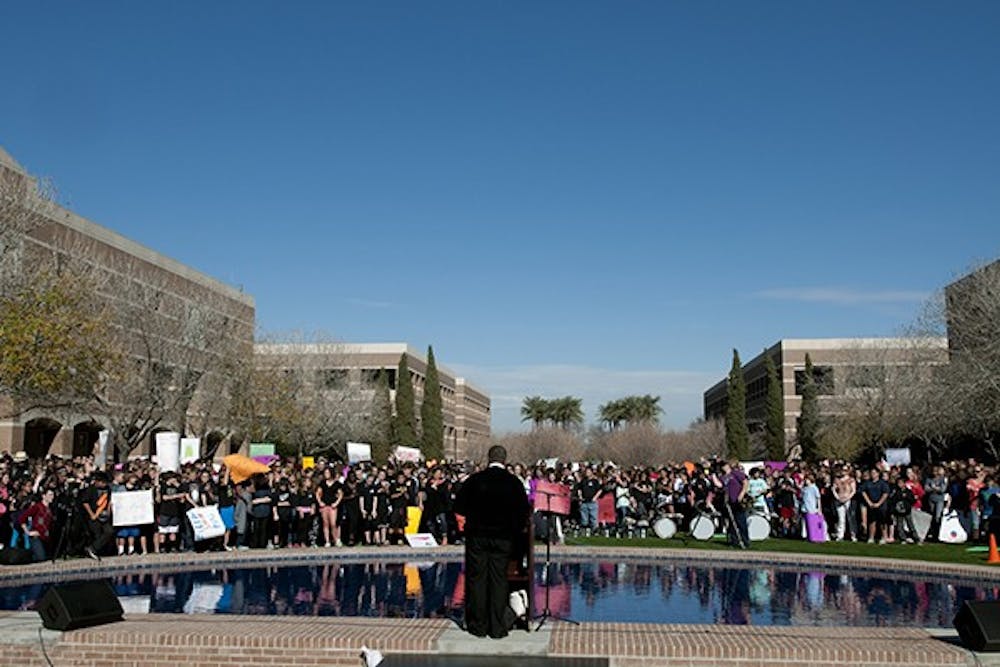 Toting protest signs and smiles, hundreds of elementary students gather at ASU’s West Campus on Wednesday Jan. 22 to reenact MLK's "I Have a Dream Speech" that took place over half a century ago in the nations capital. (Photo by Mario Mendez)
Toting protest signs and smiles, hundreds of elementary students gather at ASU’s West Campus on Wednesday Jan. 22 to reenact MLK's "I Have a Dream Speech" that took place over half a century ago in the nations capital. (Photo by Mario Mendez)After kicking the month off with a candlelight vigil, ASU prepares to honor the achievements of black Americans throughout the month of February.
Events on all campuses will focus on cultural inclusion and conversations about race and society.
Kyle Denman, the president of the Black African Coalition at ASU, said the best way to celebrate black history and honor the past is for students to participate in the events and expose themselves to a cultural conversation, particularly in a time when race relations have dominated popular culture.
“A lot of these events are educational and will provide students with knowledge that we lack in our educational system today,” Denman said. “It is our belief that students should celebrate this month respectfully, without culturally offending or mocking anyone.”
Denman said by attending events and becoming more culturally aware, students can educate their peers about acceptance and understanding.
“In recent times, we have seen a lot of young black men and women fall victim to their environment, or to those who take justice into their hands,” Denman said. “It is important to note how far we have come, but to also highlight how far we still need to go.”
The events, including workshops about safety and acceptance, luncheons, screenings of various films about race and a lecture called “Straight Talk about the N-word” are designed to start a conversation about race in the culture at ASU and in the U.S. as a whole.
At the West campus, events will focus around the theme of education, and include a lecture about the importance of education, ASU spokesman Matt Crum said in a press release.
Elsie Moore, the head of the African and African American Studies program, said Black History Month is significant because it reflects on progress, but also how far society has to go.
“Certainly, by 2015, one would expect that there would not be a need for Black History Month because the achievements of African-Americans and their role in American History would be taught every month as part of the American History curriculum to which all students are exposed,” Moore said in an email. “Sadly, this is not the case — there remains very little coverage of Black History in public school history textbooks, and misrepresentations remain a problem.”
Moore said the gap in education about issues faced by African Americans means it is important to observe Black History Month.
“We still need Black History Month if people are to learn about the role of African-Americans in American History and their remarkable achievements during slavery, after emancipation, under legal segregation and under the stress of individual-level and institutional racism,” Moore said.
By observing the month, Moore said students and society can begin to understand the importance of black history, and hopes that eventually there will no longer be a need for the month.
“The fact that we still need Black History Month to highlight and celebrate the achievements of African-Americans and their role in American history indicates that we have a long way to go as a nation in accepting that America's prosperity and ascendancy in the world was made possible through racialized slavery, and the construction of the concept of race to justify the nation's failure to act in accordance with its most sacred value, that is, ‘all men are created equal,’” Moore said.
Reach the reporter at cvanek@asu.edu or follow her on Twitter @CorinaVanek.
Like The State Press on Facebook and follow @statepress on Twitter.




